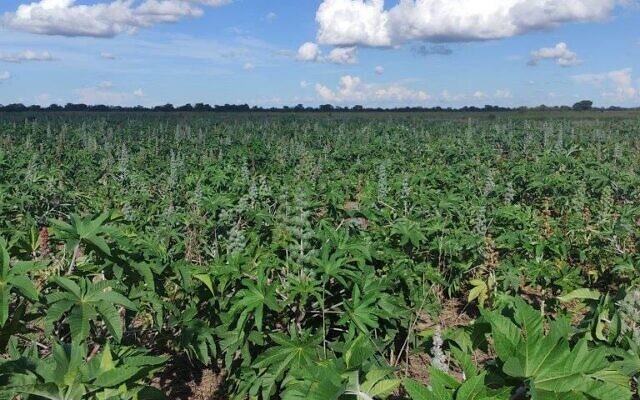Evogene subsidiary nabs $9.1m deal for supply of castor seeds for biofuel production
Casterra signs agreement with top 10 oil and gas company to sell its high-yielding castor bean seeds to be cultivated in Africa
Sharon Wrobel is a tech reporter for The Times of Israel.
Israel’s Casterra, a subsidiary of computational plant genomics firm Evogene, has secured a deal worth $9.1 million to sell its high-yielding proprietary castor seeds to one of the world’s top 10 leading oil and gas companies for sustainable biofuel production.
As part of the framework agreement signed with the unnamed oil and gas company, Casterra said it received an initial purchase order valued at an aggregate $9.1 million for the supply of a few hundred metric tons of its high-oil producing castor seeds, which are expected to be delivered during 2023 for cultivation in Africa. The genomically modified oil-rich seeds are used as a feedstock for the production of biofuel or biodiesel.
Biodiesel is based on a mix of about 93%-95% of fossil oil and 5%-7% of non-fossil oil derived from plants such as castor. In recent years, castor oil is also being used in other areas and applications such as lubricants, cosmetics, pharma, electronics, and aerospace.
Today most of the global castor supply come from India, where castor is grown with traditional methods and the harvesting is by hand. The Rehovot-based company is developing high-yield castor seed varieties leaning on Evogene’s AI-based genomics technology and computational know-how, which specializes in genetic modification of plants for industrial purposes.
“The deal we announced is just the tip of the of the iceberg,” Casterra CEO Eyal Ronen told The Times of Israel. “We signed a frame agreement for the coming years, meaning that the numbers in terms of the size of orders in dollar terms are expected to be doubled next year and reach even four times the current deal over the next five years.”
Ronen said the company received the order from one of the top 10 global oil and gas companies, which comprise the likes of Chevron, Enron, Shell, Total, and YPF.
The deal comes as EU regulation is requiring that all transportation fuels including diesel contain about 10% of biofuel, which is set to grow to 14% by 2030. In addition, the EU requires that biofuel production should come from feedstock that is not in competition with food crops.
More common biofuel feedstock in Europe includes palm oil, soybean oil and other edible oils such as sunflower and canola. Late last year, the regulator asked European companies to phase out the import and use of palm oil linked to deforestation by 2030.
“The early adopters of biofuel are the oil and gas companies, which are looking immediately for alternatives for palm oil as they need extensive volumes,” said Ronen.
This is where Casterra believes it has a market opportunity. By utilizing Evogene’s AI-based tech and proprietary plant genomic databases, and incorporating advanced computational capabilities, Casterra has produced castor varieties with a yield the company says is four to six times higher than the wild type varieties found in nature and is generating oil content of 50% versus natural varieties which extract 30% to 40% or less. In addition, it built a mechanical harvesting and dehulling machine to address the global demand for increased and stable castor oil supply.
“We have a database of more than 300 varieties that we collected from 40 different countries and with the use of AI that gives us the possibility to screen for information quickly and apply advanced and accurate breeding methods… we can make the development specific to the characteristics of the oil whether it is for the aviation industry or car industry,” Ronen said. “We are developing what is called in the industry genetic markers or genomic markers.”
The main advantages of castor is that it is not edible; it is easy to grow, thriving on marginal lands where raising food crops is difficult; and it provides the best return of oil in terms of dollars per hectare and cultivation practices, as it doesn’t require irrigation, Ronen added.
As biofuel requirements rise, the interest in using castor oil as a vegetable source for biofuels is also expected to grow. The global castor oil & derivatives mechanized market is expected to reach $2.06 billion by 2028 versus $1.55 billion in 2022, according to data by Market Reports World.
The size of the biodiesel market reached NIS 32.05 billion in 2021 and is estimated to grow to $75.57 billion in 2030, according to analysis by Emergen Research.
Casterra operates three production sites. The firm has an R&D center in Israel and a local production site in Brazil, another site in Zambia.
Going forward, Ronen sees future R&D focused on matching the characteristics of the oil for different purposes such as aviation industry or polymers.











